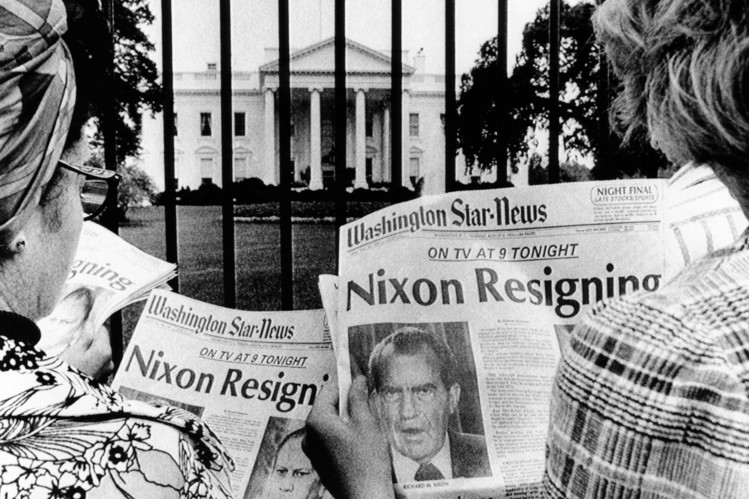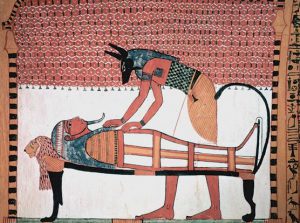Winner of the Fall 2019 StMU History Media Award for
Best Article in the Category of “Political History”
“People have got to know whether or not their President is a crook. Well, I’m not a crook. I’ve earned everything I’ve got.”1 President Richard Nixon at a November 17, 1973 news conference. The state of American politics was at an all time low during Nixon’s second term. He was in a war against his own words and actions everyday, leading up to him resigning from his presidency. On October 20, 1973, the day that has subsequently become known as the “Saturday Night Massacre,” momentum towards the impeachment of Nixon grew rapidly. The Saturday Night Massacre was when President Richard Nixon fired Special Prosecutor Archibald Cox as well as accepting the resignations of Attorney General Elliot Richardson and Deputy Attorney General William Ruckelshaus. Peter Rodino had been Chairman for the House Judiciary Committee for only a few months when his committee began to hear the case for Nixon’s impeachment. On October 23, 1973, resolutions calling for impeachment, impeachment investigations, and appointment of a special prosecutor were introduced against Nixon.2
Peter Rodino went from being a little man, both in reputation and in stature, to being the big boss by working sixteen to eighteen hour work days as soon as the congressional recess ended on January 21, 1974. During this time, Rodino went through extreme mental and physical changes. Due to his time being consumed by the amount of work he was indulging in, he had gained some weight. So in order to lose it, he would skip lunch throughout the week and existed instead on black coffee.3 The committee, as a whole, was not able to function properly, due to their inability to properly retrieve evidence to use against Nixon and figure out how to properly protect it. In February of 1974, Rodino believed he picked up a virus from Florida, leading him to have shortness of breath, become light headed, have chest pains intensify and became tired quicker. He checked up with a doctor after a break on the House floor after becoming alarmed of the symptoms he was experiencing. The doctor sent him to Bethesda Naval Hospital where he was given an electrocardiogram examination and other checks to determine if he had suffered from a heart attack, which he hadn’t, but his doctor did tell him to rest.4

After the Saturday Night Massacre, Rodino began his committee’s investigation. It was not until October 30, 1973, that the House Judiciary Committee began to consider the impeachment process against Nixon. In early January 1974, speculation arose that Nixon was going to resign from the presidency. On February 6, 1974, the process for impeaching Nixon was formally initiated, with the House of Representatives passing a resolution. The resolution gave the Judiciary Committee the authority to investigate whether there was sufficient grounds to impeach Nixon of high crimes and misdemeanors in relation to the Watergate break-in and subsequent cover-up. On April 11, 1974, the Judiciary Committee subpoenaed 42 White House tapes of key conversations. A week later, Leon Jaworski (the Special Prosecutor for the Watergate Case) sent subpoenas for 64 additional recordings.5 Although Nixon wanted to refuse, he eventually ordered transcripts of the tapes to be edited, or removed, so he could send that to Jaworski. The transcripts became public on April 30; however, the tapes and other documents were still withheld from Jaworski. The Judiciary Committee rejected Nixon’s transcripts stating that they did not comply with the terms of the subpoena.6 The Democratic half of the proposed ad hoc committee met behind closed doors, so that after the general staff meeting, Jerry Zeifman (Chief Counsel of the House Judiciary Committee), Larry O’Brien (Chair of Democratic National Committee), and Rodino went to Rodino’s office to draft the statement he expected to issue after the Democrats met. When the three got there, an aide told them the committee had received four hundred telegrams responding to Nixon’s tape offer. They all said to impeach him anyhow.7

Peter Rodino spoke to the House in February 1974 saying, “Whatever the result, whatever we learn or conclude, let us now proceed with such care and decency and thoroughness and honor that the vast majority of American people, and their children after them, will say: ‘That was the right course. There was no other way.'”8 On July 27, 1974, the Judiciary Committee approved the first article of impeachment against Nixon. Two more articles were approved on July 29 and 30. The Articles of Impeachment were over Nixon’s obstruction of justice, abuse of power, and contempt of Congress. Peter Rodino gave a speech during the 1974 voting of Articles for Impeachment saying, “We have deliberated. We have been patient. We have been fair. Now the American people, the House of Representatives and the Constitution and the whole history of our republic demand that we make up our minds.”9
During the House of Judiciary Committee impeachment hearings, the primary focus was Article One of the United States Constitution. The power to impeach was vested directly in the House of Representatives by the second section of the first article of the Constitution. To grant court intervention would be to strike at the very heart of the concept of three co-equal branches of government.10 “Article I, section 3, clause 7 of the Constitution provides that a person removed from office by impeachment and conviction ‘shall nevertheless be liable to Indictment, Trial, Judgment and Punishment, according to the Law.’ But there are no guidelines in the Constitution about a President who has resigned.” Article I charged Nixon with Obstruction of Justice that had a vote of 27 to 11. Article II charged Nixon with Abuse of Power that had a vote of 28-10. And lastly, Article III charged Nixon with Contempt of Congress with a vote of 21-15.11 The other two articles that were being considered, were rejected. They charged Nixon with Ordering the Falsification of records (concerning the secret bombing of Cambodia), 12-26, and Personal Finances and Failure to Pay Taxes, losing by the same margin. Evidence of the tapes surfaced on August 5, when Nixon complied with the U.S. Supreme Court’s ruling requiring him to provide transcripts of the missing tapes. The evidence that the tapes showed was that clearly he implicated himself in a cover-up of the Watergate break-in. August 7, 1974, Senators Goldwater and Scott, and Representative Rhodes met with Nixon in the Oval Office. They spoke to him about his support diminishing in Congress. Goldwater later wrote, “[Nixon] knew beyond any doubt that one way or another his presidency was finished.”12

The president resigned ten days after the Judiciary Committee voted on the three articles, before the full House voted on whether to approve the articles for a Senate trial. On August 8, 1974, Nixon announced that he was resigning from the presidency, labeling himself as the first president in U.S. history to voluntarily resign from office. On August 22, a 528-page report appeared laying out details of what it called the “clear and convincing evidence” against Nixon. Criminal prosecution was a possibility on both the federal and state level against Nixon. However, on September 8, 1974, President Gerald Ford issued a full and unconditional pardon of Nixon. This pardon immunized him from prosecution for any crimes he had “committed or may have committed or taken part in” as president.13 Nixon’s official response to the pardon (September 1974): “Looking back on what is still in my mind a complex and confusing maze of events, decisions, pressures, and personalities, one thing I can see clearly now is that I was wrong in not acting more decisively and more forthrightly in dealing with Watergate, particularly when it reached the stage of judicial proceedings and grew from a political scandal into a national tragedy. No words can describe the depths of my regret and pain at the anguish my mistakes over Watergate have caused the nation and the presidency, a nation I so deeply love and an institution I so greatly respect.”14 However, Nixon proclaimed his innocence until his death in 1994.
- Carroll Kilpatrick, “Nixon Tells Editors, ‘I’m Not A Crook’,” November 18, 1973, The Washington Post, https://www.washingtonpost.com/politics/nixon-tells-editors-im-not-a-crook/2012/06/04/gJQA1RK6IV_story.html. ↵
- Howard Fields, High crimes and Misdemeanor: Was Nixon Guilty? How the Rodino Committee Reached Its Conclusion (New York: Norton, 1978), 6. ↵
- Howard Fields, High crimes and Misdemeanor: Was Nixon Guilty? How the Rodino Committee Reached Its Conclusion (New York: Norton, 1978), 5, 103. ↵
- Howard Fields, High crimes and Misdemeanor: Was Nixon Guilty? How the Rodino Committee Reached Its Conclusion (New York: Norton, 1978), 5, 104. ↵
- Howard Fields, High crimes and Misdemeanor: Was Nixon Guilty? How the Rodino Committee Reached Its Conclusion (New York: Norton, 1978), 193. ↵
- Stanley I. Kutler, The Wars of Watergate: The Last Crisis of Richard Nixon (New York: Knopf, 1990), 323. ↵
- Howard Fields, High crimes and Misdemeanor: Was Nixon Guilty? How the Rodino Committee Reached Its Conclusion (New York: Norton, 1978), 52-53. ↵
- The Washington Post, “Peter Rodino Jr., 95; Led Nixon Impeachment Hearings in ’74,” Los Angeles Times, May 8, 2005, https://www.latimes.com/archives/la-xpm-2005-may-08-me-rodino8-story.html. ↵
- Peter Rodino, “Watergate Figure Peter Rodino Dies” (speech, Washington, DC, July 1974. NPR. https://www.npr.org/templates/story/story.php?storyId=4645365. ↵
- Howard Fields, High crimes and Misdemeanor: Was Nixon Guilty? How the Rodino Committee Reached Its Conclusion (New York: Norton, 1978), 5, 105. ↵
- “Articles of Impeachment,” 1995-2019, Watergate.info,https://watergate.info/impeachment/articles-of-impeachment. ↵
- Bonnie K. Goodman, “OTD in History… July 27, 29 & 30, 1974, the House introduces articles of impeachment against President Richard Nixon,” July 27, 2018, Medium, https://medium.com/@BonnieKGoodman/otd-in-history-july-27-29-30-1974-the-house-introduces-articles-of-impeachment-against-8d638cb266c0. ↵
- Stanley I. Kutler, The Wars of Watergate: The Last Crisis of Richard Nixon (New York: Knopf, 1990), 555. ↵
- “The Statement by Nixon,” September 9, 1974, The New York Times, https://www.nytimes.com/1974/09/09/archives/the-statement-by-nixon-pr.html. ↵



51 comments
Eliza Merrion
This article was very well written and I can tell a lot of research went into writing this. I especially liked the quotes you included throughout the text. I knew about President Nixon’s resignation only briefly. Therefore it was very interesting to learn that he proclaimed he was innocent until his death. It was also fascinating to learn more about the Watergate scandal and how heavily it impacted Nixon. Overall very well written article and well researched information.
Dominique Rodriguez
this article was well written and explained thing very well. i never new that nixon was impeached becasue of all the crimes he has done. i do remember in class talking about his impeachment but i never new why he got impeached. the things he has done he was a ashamed of it because he was the president of our country. at the ned its crazy he held his innocence till his death. i honeslty didnt know anything about the watergate scandal until now. but i wouldn’t think nixon would do such a thing. this article gave great explanation about nixons impeachment.
Desiree Arizmendez
It is very interesting how Nixon kept saying he was innocent up until his last moments. There was much proof that he was not innocent and people still believed that he was innocent. A lot that had happened really ties into with much of what has been going on today, and it is crazy that we have access to all this history and we still allow crooked people to repeat it all over again. You did a wonderful job explaining Nixon’s impeachment and the scandal very well.
Maya Simon
I really enjoyed this article and the topic that you choose to talk about. These types of events are historical, the fact that Nixon resigned ten days after the vote is kind of interesting. I was never fully aware of the process that happens when you’re being chosen to be impeached but this article taught me a lot. Great Job.
Aaron Sandoval
I really enjoyed this article and the topic that it covered. This article was well done and did a good job of laying the information out. The impeachment and resignation of President Nixon was always something that upset me because after the hearings and the discovery of the tapes it seemed almost certain Nixon would be the first president to be convicted but resigned before he could be convicted. This article was well done and covered a really important event that shocked the nation.
Eliane Castorena
I was aware of Nixon’s resignation from office and about the Watergate scandal, but I did not knew all the details about how it all went down until I read this article. The fact that he resigned ten days after the articles were approved and that President Ford pardoned Nixon from all the crimes he was accused of, makes it seem like this was all planned to make him look not so bad to the American public. Nonetheless, this story made history as Nixon was the first ever U.S. president to resign voluntarily.
Sofia Almanzan
I think anyone who has taken US History in some form or fashion has heard of the Watergate Scandal. This article does a great job of summarizing the entire process. I find this particular impeachment process interesting because Nixon was almost removed from office where as Donald Trump and Bill Clinton were impeached but only by one part of congress.
Mia Hernandez
I learned about the Watergate scandal in my AP US History course and back then I had a brief understanding of the event, but it nonetheless astounded me that a President would consider doing something on that level. What doesn’t surprise me is that Nixon decided to resign so that he would be leaving office on his terms rather than that of Congress when the impeachment verdict came in.
Vanessa Barron Ortiz
“President Gerald Ford issued a full and unconditional pardon of Nixon”. I wrote this quote again because it made me question whether or not Nixon planned to do this the whole time, Did he step down to make himself look good? I think the fact that even until his death he was trying to make people believe that he didn’t do the thing he was going to get impeached for makes him look a little more incriminated. I also feel for the people trying to gather the evidence because the president made it very hard to get.
Samantha Zamorano
I learned about the Watergate Scandal in middle school but really, I didn’t even process anything because it was all too complex for my 13-year old brain. This article sums up the scandal and the impeachment process very well! I did not know that Nixon received a presidential pardon, but that makes sense since he was never taken to prison. To this day, I don’t know why presidential pardons exist. The evidence stacked against Nixon was damning.